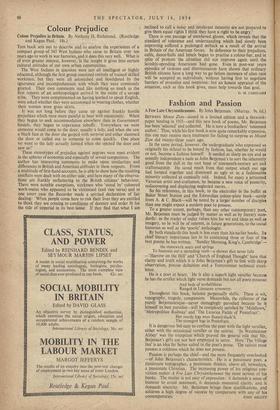Fashion and Passion
A Few Late Chrysanthemums. By John Betjeman. (Murray. 9s. 6d.) BETWEEN Mount Zion—issued in a limited edition and a firework- paper binding in 1931—and this new book of poems, Mr. Betjeman has been selected' and collected. He is now a booksellers' esteemed author.' Thus, while his first book is now quite remarkably expensive, this one may receive stern treatment for failing to surprise as Mount Zion did twenty-three years ago.
In the same period, however, the undergraduate' who expressed so originally his refusal to be bound by fashion, has, whether he would or not, become a fashion himself. It needed as sharp an eye and as soundly independent a taste as John Betjeman's to sort the inherently good from the dull in the vast heap of nineteenth-century art and craftsmanship. He saved much from that output which our ago had lumped together and dismissed as ugly or in a fashionable minority collected as comically odd. Indeed, for many a jettisoned Victorian artist and craftsman, he became a new voice of posterity, rediscovering and displaying neglected merits.
So his references, in this book, to the electrolier in the buffet at Baker Street Station and the Edwardian colour-plate book—surely from A. & C. Black—will be noted by a larger number of disciples than one might expect a modern poet to possess. To a greater extent, perhaps, than any other contemporary poet, Mr. Betjeman must be judged by matter as well as by literary stan- dards: as the reader of today values him for wit and ideas as well as imagery, so he will be of interest, in future generations, to the social historian as well as the 'poetic' anthologist.
By both standards this book is less even than his earlier books. Its chief literary importance lies in its containing three or four of the best poems he has written. 'Sunday Morning, King's, Cambridge'-- the stonework soars and springs To fountain out a spreading vault—a shower that never falls —'Harrow on the Hill' and 'Church of England Thought' have that clarity and truth which it is John Betjeman's gift to link with sharp observation, precise definition and a Tennysonian technical excel- lence.
He is a poet at heart. He is also a superb light versifier because he has the artifice which light verse demands but not all poets possess: And beds of umbelliferae
Ranged in Linnaean symmetry.
Throughout this book, balance perpetually shifts. There is wit, topography, tragedy, compassion. Meanwhile, the collector pf the purely Betjemanesque—never damagingly parodied because he is himself its best parodist—will be completely satisfied by 'Middlesex,' 'Metropolitan Railway' and 'The Licorice Fields of Pontefract': Her sturdy legs were flannel-slack'd,
The strongest legs in Pontefrgct.
It is dangerous but easy to confuse the poet with the light versifier, either with the occasional versifier or the satirist. 'In Westminster Abbey' was the exception which proved the general rule that Mr. Betjeman's gifts are not best employed in satire. Here 'The Village Inn' is an idea far better suited to the poet's prose. The satirist must possess a coldness which he does not possess.
Passion is perhaps the chief—and the most frequently overlooked —of John Betjeman's characteristics. He is a passionate poet, a passionate topographer, a passionate thinker, above all, nowadays, a passionate Christian. The increasing power of his religious con- viction makes A Few Late Chrysanthemums the most serious of his books. The matter is not easy of expression: it demands a sense of humour to avoid sentiment, it demands measured clarity, and it demands sincerity. Mr. Betjeman brings these qualifications, and achieves a high degree of success by comparison with any of his


































 Previous page
Previous page